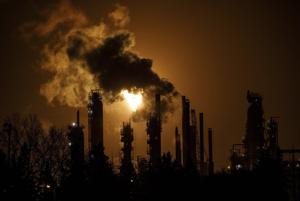Business
Record CO2 Levels Signal Urgent Need for Climate Action in Canada

A recent report indicates that carbon dioxide levels have reached unprecedented heights in 2024, prompting urgent calls for Canada to enhance its climate initiatives. The World Meteorological Organization (WMO) highlighted in its annual greenhouse gas bulletin that the growth rate of CO2 has tripled since the 1960s, affected by ongoing fossil fuel emissions and a decline in the effectiveness of natural carbon sinks, such as forests and oceans.
According to Damon Matthews, a climate scientist at Concordia University and a member of an independent federal climate advisory group, the report serves as a crucial wake-up call for governments worldwide. He emphasizes that Canada cannot afford to yield to external pressures, particularly from figures like former U.S. President Donald Trump, who has dismissed climate change as a “con job” and undermined key renewable projects.
The WMO’s findings attributed the record CO2 growth in 2024 to significant emissions from wildfires and reduced absorption rates from land and ocean ecosystems. This year is noted as the hottest on record, exacerbated by a strong El Niño climate pattern. Typically, Earth’s land ecosystems and oceans absorb about half of the carbon emitted into the atmosphere. However, the report warns that these carbon sinks are increasingly less effective due to rising temperatures, which diminish ocean absorption and lead to drier vegetation and more intense wildfires.
Matthews cautioned that the global community has not yet established a “new normal” in terms of climate stability. He stated, “We are nowhere near the new normal at the current trend. Things are going to continue getting worse and worse until we actually solve the problem fundamentally.” He insists that global emissions must be halved and continually reduced towards zero to stabilize CO2 levels.
The WMO’s bulletin supports findings from a June report co-authored by Matthews and over 60 other scientists, which predicted that the world could exceed the international target of a 1.5 degrees Celsius increase in global temperatures within the next three years. Simon Stiell, the United Nations climate chief, has indicated that the Earth is currently on a trajectory toward a rise of 3 degrees Celsius.
As the global community prepares for the upcoming UN climate summit, COP30, scheduled for next month in Brazil, leaders are expected to face mounting pressure to elevate their climate action efforts. Oksana Tarasova, co-ordinator of the WMO’s Greenhouse Gas Bulletin, stressed the importance of expanding greenhouse gas monitoring to support these initiatives.
The report revealed that the growth rate of CO2 has accelerated from an annual average increase of 2.4 parts per million per year in the decade from 2011 to 2020, to 3.5 ppm from 2023 to 2024. Data from the U.S. National Oceanic and Atmospheric Administration confirms that carbon dioxide rates continue to rise at one of the highest rates recorded, although slightly less than the previous year’s surge.
This analysis underscores the critical need for robust climate policies and immediate action to mitigate the impacts of climate change. With the stakes higher than ever, Canada and other nations must prioritize environmental sustainability to safeguard the planet’s future.
-

 World3 months ago
World3 months agoScientists Unearth Ancient Antarctic Ice to Unlock Climate Secrets
-

 Entertainment3 months ago
Entertainment3 months agoTrump and McCormick to Announce $70 Billion Energy Investments
-

 Science3 months ago
Science3 months agoFour Astronauts Return to Earth After International Space Station Mission
-

 Lifestyle3 months ago
Lifestyle3 months agoTransLink Launches Food Truck Program to Boost Revenue in Vancouver
-

 Technology2 months ago
Technology2 months agoApple Notes Enhances Functionality with Markdown Support in macOS 26
-

 Top Stories7 days ago
Top Stories7 days agoUrgent Update: Fatal Crash on Highway 99 Claims Life of Pitt Meadows Man
-

 Sports3 months ago
Sports3 months agoSearch Underway for Missing Hunter Amid Hokkaido Bear Emergency
-

 Politics2 months ago
Politics2 months agoUkrainian Tennis Star Elina Svitolina Faces Death Threats Online
-

 Technology3 months ago
Technology3 months agoFrosthaven Launches Early Access on July 31, 2025
-

 Politics3 months ago
Politics3 months agoCarney Engages First Nations Leaders at Development Law Summit
-

 Entertainment3 months ago
Entertainment3 months agoCalgary Theatre Troupe Revives Magic at Winnipeg Fringe Festival
-

 Politics7 days ago
Politics7 days agoShutdown Reflects Democratic Struggles Amid Economic Concerns



















